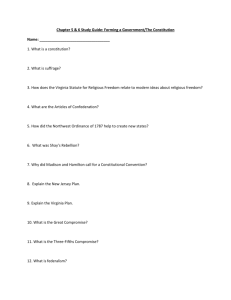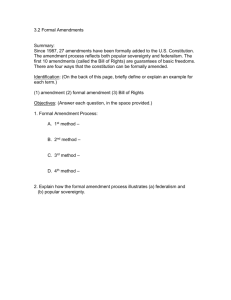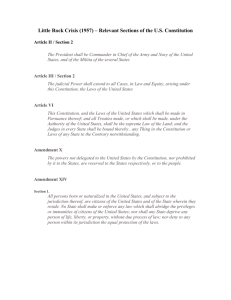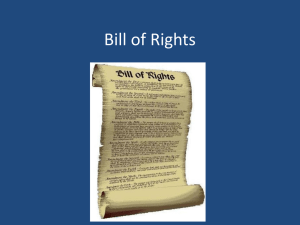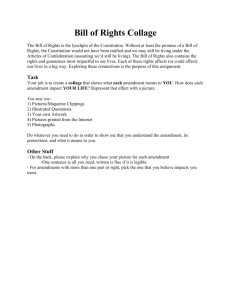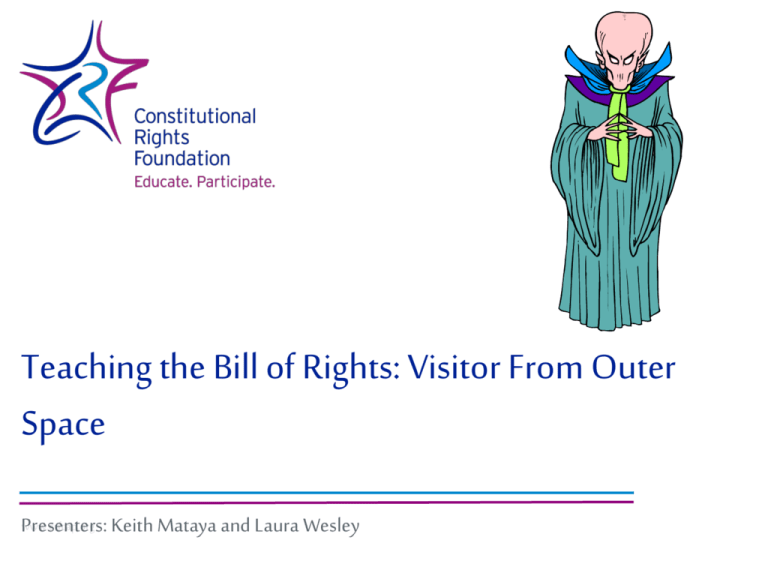
Teaching the Bill of Rights: Visitor From Outer
Space
Presenters: Keith Mataya and Laura Wesley
www.crfcap.org
Constitutional Rights Foundation
CRF is a non-profit,
non-partisan,
national educational
organization. For
over 50 years we’ve
provided programs,
training, and
materials supporting
teachers and students
in the fields of civic
and law-related
education.
Check us out on the web @ www.crf-usa.org
Objectives
Participants will be able to...
Use Common Core-aligned approaches to
teaching the social sciences.
Implement a lesson to help students
understand the Constitution.
See how to use complex texts to engage
students in critical thinking, discussion, and
writing.
www.crfcap.org
POLL
Selected CCSS’s
Reading Standards for Literacy in History/Social Studies
RH.6–8.1
Cite specific textual evidence to support analysis of primary
and secondary sources.
RH.6–8.2
Determine the central ideas or information of a primary or
secondary source; provide an accurate summary of the
source distinct from prior knowledge or opinions.
RH.6–8.4
Determine the meaning of words and phrases as they are
used in a text, including vocabulary specific to domains
related to history/social studies.
Visitor From Outer Space
Lesson Overview:
In this lesson, students decide which of the rights included in the
Constitution’s Bill of Rights they value the most.
First, students discuss the basic rights of all Americans.
Next, they read a short story about a hypothetical alien creature that takes
over the world. The creature will allow humans to keep five rights.
Finally, students work in small groups to decide on the five rights they find
most important and report back their findings.
Focus Question:
What would society look like without
the idea of “rights?”
The Constitution
and Bill of Rights
© Constitutional Rights Foundation, Los Angeles, 2002
All rights reserved.
Imagine that America was
suddenly a kingdom...
With one supreme ruler...
The King of America has the power to
make new laws that all the citizens have
to follow.
The King of America is the ruler
of all of the United States.
He does not need to ask Americans for
permission to collect or raise taxes.
Police officers and soldiers have the right to enter
and search homes and businesses when they feel it is
necessary.
They have the right to take any goods that
Americans have not paid taxes on.
If the military needs to occupy a community,
Americans will open their homes to them and
provide soldiers with food and shelter.
The King has ordered the media
to cease publishing or
broadcasting anything negative
about the King or the King’s
government.
Americans who break these or any
other of the Kingdom’s laws will
be tried in the King’s court by a
judge appointed by the King.
There will be no jury.
How do you like your new
country?
How do you think other
Americans would react to
this king and government?
Early American colonists experienced
situations similar to these.
They were tired of being ruled by the
British kingdom. Battles broke out.
The colonists declared independence.
The war was on.
The Revolutionary War.
While the colonists were fighting the war,
they were also trying to set up a new
government.
They realized they had a problem.
How do we form a government that will
not turn out like the British rule?
What should our government be like?
Certainly not like a kingdom!
Forming a democratic government had never
been done before, so the Colonial leaders took
a first stab at it.
They wrote a plan for the
government and called it the
Articles of Confederation.
The Articles of Confederation gave the states a lot of
power and the central government very little.
The founders wanted to make sure that no person or
government had power like the British king.
But the plan didn’t work.
Some of the problems were…
The central government didn’t have enough
power to get things done like...
Pay the soldiers
who had fought in
the war.
The states had so much power that things got confusing.
Every state printed its own money.
It was hard to travel and buy things.
The United States were not so united. Leaders began to worry that
if we had another war, we would just fall apart.
It turned out that we needed a stronger
central government.
The leaders from the states
gathered at Independence Hall in
Philadelphia to work on a new
plan for the government.
The question before them…
Just how much power should the central
government have?
At the Constitutional Convention, the founders came
up with several things:
They wanted to ensure a balance of power.
Some powers should go to the central government.
Some powers should go to the states.
They called this Federalism.
To make sure that the central government
could not be run by one individual or group,
they separated the powers of the central
government among three branches.
Judicial
Each branch would have its own, but equal, powers.
Having three branches of government provided a way
for “checks and balances.”
The founders had one
more important question
to deal with:
What about our individual rights?
Should we put a list of our rights
in the Constitution?
Some people argued against adding a bill of rights.
No, because this might mean
that these were the ONLY
rights we had. We couldn’t
possibly list ALL the rights
free citizens should have!
Others advocated adding a bill of rights.
Yes, because this would ensure
that no laws now or in the
future could infringe on our
basic individual rights.
After the Convention ended, arguments continued about
whether to add a bill of rights to the Constitution.
Even after the Constitution was ratified, some states insisted
that a bill of rights be added.
James Madison, a Congressman from Virginia, persuaded
the first Congress to get moving on a bill of rights.
This was interesting because Madison,
along with Alexander Hamilton
and John Jay,
had opposed adding a
bill of rights.
NO.
Not necessary.
I think not.
Nope.
In fact, they felt so strongly about it that
they published over 80 essays in
newspapers to try to convince people that
the Constitution should be ratified as is.
The collection of essays is
known as the Federalist
Papers.
Madison had a change of heart, though.
He did some serious thinking about the whole thing
and talked to his friends about it, especially
Thomas Jefferson.
Madison became convinced that a bill of rights
should be added, since many of the states were
counting on it.
He went before the first Congress and presented
his ideas. Congress was busy with other important
matters, but...
Madison urged members of Congress to make adding a bill
of rights a priority. They finally agreed.
Madison got to work on the Bill of Rights.
He used ideas from states that already had their own bills of rights.
He thought about what we could learn from history and philosophy.
k
And he continued to talk to his friends.
On December 15, 1791, ten amendments
were added to the Constitution.
The Bill of Rights, along with the
Constitution, became the law of the land.
The ten amendments in the Bill of Rights
guarantee basic liberties.
Freedom of Expression
1st Amendment
Religion
Separation of church and state
Free exercise of religious beliefs
Speech
Press
Assembly
&
Petition
2nd Amendment
Keep and bear arms.
“Well regulated militia”
3rd Amendment
Quartering of Soldiers
4th Amendment
Search and Seizure
5th Amendment
Indictment by Grand Jury.
No double jeopardy.
Due process of law.
Just compensation.
Don’t have to testify against yourself.
6th Amendment
Speedy, public trial.
Informed of accusation.
Right to an attorney.
Impartial jury.
Witnesses:
Confront those against you.
Have your own.
7th Amendment
Jury trial for civil case.
(at least $20)
8th Amendment
No excessive bail, fines.
No cruel or unusual
punishment.
9th Amendment
These rights are not the
only rights we have.
10th Amendment
Powers not delegated by the
Constitution are reserved for
the states and the people.
We the People
The founders included in the Constitution a rule
stating that it could be amended, or changed.
Over time, people and attitudes have changed,
and new amendments have been added to
protect the rights of all citizens.
13th Amendment (1865)
Outlaws slavery.
14th Amendment
(1868)
All people born or naturalized in
the U.S. are citizens.
All citizens must be treated
equally under the law.
Due process of law for all.
Sometimes called the
“Civil War
Amendments.”
15th Amendment (1870)
Right to vote cannot be denied based on
“race, color, or previous …servitude.”
And later...
19th Amendment (1920)
Women’s right to vote.
Since the ten amendments in
the Bill of Rights were adopted
in 1791, the Constitution has
been amended only
17 more times.
The End
The Constitution and Bill of Rights
Designed by Marshall Croddy
Written by Keri Doggett & Bill Hayes
Graphic Design and Production
by Keri Doggett
Special thanks to John Kronstadt, CRF Board
of Directors, for inspiration and input.
© Constitutional Rights Foundation, Los Angeles, 2002.
All rights reserved.
A Visitor
From Outer
Space
Constitutional Rights Foundation
Imagine it is the year 2025. You are watching your wallsized television and a special news bulletin comes on.
This strange creature appears on the screen and informs you
that it has taken over America.
NEWS
BULLETIN
You rapidly flip through all 500 channels and it appears on
every channel. It says...
ATTENTION!!! I am
Sthgir from planet
Noitutitsnoc. Just
as I have taken over
television, I will
take over your lives.
But I come in
peace. I realize
that individual
freedom means a
great deal to
American citizens.
Therefore, I will
not take away all
your rights.
You have a choice. From a list of basic
rights, you may choose five to keep.
Think carefully before you vote, as all
your rights as citizens will end except
for the ones you select.
You will work with a group of other
citizens to decide, and your decision
must be unanimous.
Failure to reach a unanimous decision
will result in the termination of all
rights. The list of choices will now
appear on screen.
Choose Only Five
1.
2.
3.
4.
5.
6.
7.
8.
9.
10.
11.
Right to have a state militia and bear arms.
Right to freedom of speech.
Right to a lawyer.
Right to protection from cruel and unusual
punishment.
Right to freedom of the press.
Right to a jury trial.
Right to freedom of religion.
Right to peacefully assemble.
Right to privacy.
Protection from self-incrimination.
Right to equal protection of the laws.
Was it difficult to reach a unanimous
decision? Why or why not?
Which rights were the easiest for you
to give up? Why?
How would our society be different if we
were limited to the five rights you chose?
What important or surprising things did
you learn about the Bill of Rights or
Constitution today?
A Visitor from Outer Space
Designed by Marshall Croddy
Written by Keri Doggett & Bill Hayes
Graphic Design by Keri Doggett
Production by Andrew Costly
A Visitor From Outer Space is adapted from Responsibilities and Rights
in Schools, 1978, by Donald P. Vetter and Linda Ford of the Carroll
County Public Schools, Westminster Maryland. Used with permission.
Handout A: List of Rights
Choose Only Five
1.
2.
3.
4.
5.
6.
7.
8.
9.
10.
11.
Right to have a state militia and bear arms.
Right to freedom of speech.
Right to a lawyer.
Right to protection from cruel and unusual punishment.
Right to freedom of the press.
Right to a jury trial.
Right to freedom of religion.
Right to peacefully assemble.
Right to privacy.
Protection from self-incrimination.
Right to equal protection of the laws.
Writing Assignment One:
Choose ONE of the Amendments in the Bill of Rights that you feel is
most important and write a paragraph discussing why you think the
right outlined in that Amendment is important.
• First, put the Amendment in your own words.
• Find one example in American history or in current events where
the particular right you chose was especially important. Feel free
to use examples from the before the ratification of the Bill of
Rights or from later periods of American history (e.g. Civil Rights
Movement, etc…).
• Lastly, discuss why this particularly Amendment is important to you
in 1-2 sentences.
Writing Assignment Two:
Would you amend the Constitution? Is there something you believe
should be added to the Bill of Rights? Did the Founding Fathers miss
something? Write a paragraph detailing your new Amendment and
discus why it is important.
• In one paragraph, clearly state your new amendment and why you
think it would be a valuable right to add to the Constitution.
• You may want to research or take into consideration other ideas
that have been proposed for the US Constitution or that have been
included in the constitutions of other nations.
Writing Assignment Three:
Write one paragraph discussing what you think our society would look
like without the Bill of Rights.
• Write one sentence stating your opinion AND a reason (or reasons) a
Bill of Rights was necessary, or not necessary, to add to the
Constitution.
• Write two-four sentences describing what you think society would
look like without a Bill of Rights.
• Discuss an example from your personal experience that is impacted
by the Bill of Rights. Does the protections offered to individuals
help you? Does it harm you? Make sure to explain why.
UPCOMING FREE WEBINARS
Register:
http://www.crf-usa.org/pd
Civic Action Project: Project-Based Learning Gets Students Ready for Their
Future.
Using Supreme Court Cases to Teach Common Core Standards with Special
Guest Erwin Chemerinsky.
If Men Were Angels: Teaching the Constitution with the Federalist Papers.
The Common Core Does Not Have to Be a Great Wall: Fun Ways to Teach
About China.
Civic Engagement + Writing = Uncommonly Good Idea!
“You CAN Make Teaching From Primary Sources Exciting: Three Successful
Strategies for Middle School and High School Teachers.”
THANK YOU!
For support and
information visit:
www.crf-usa.org



